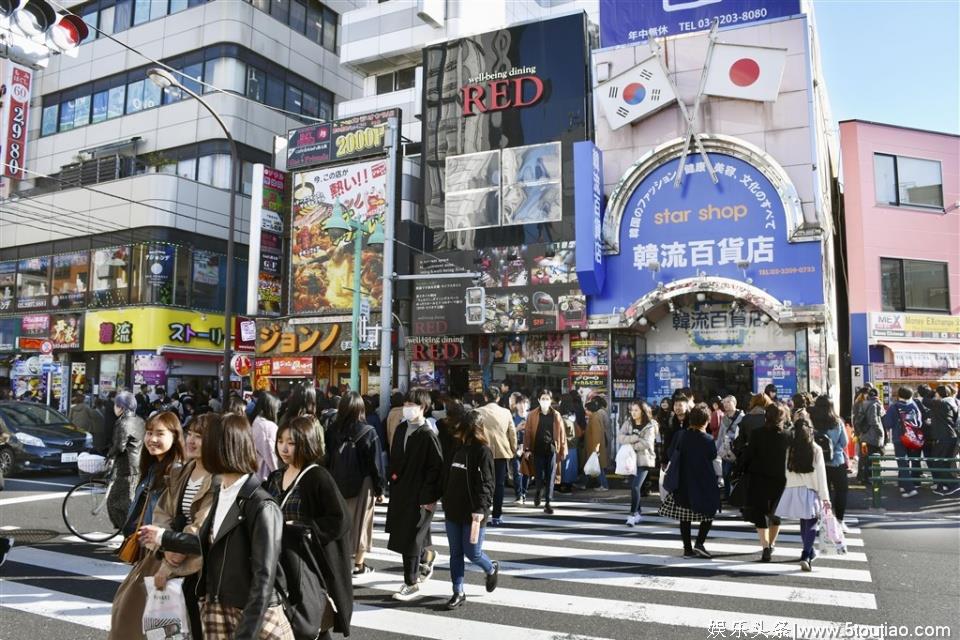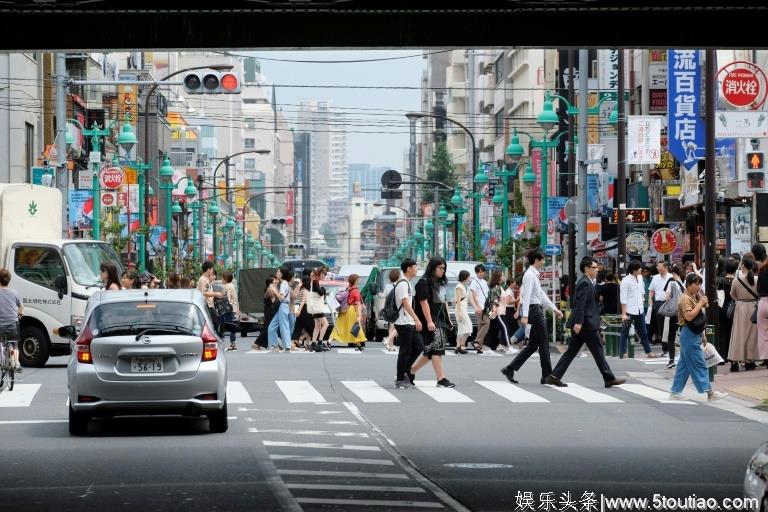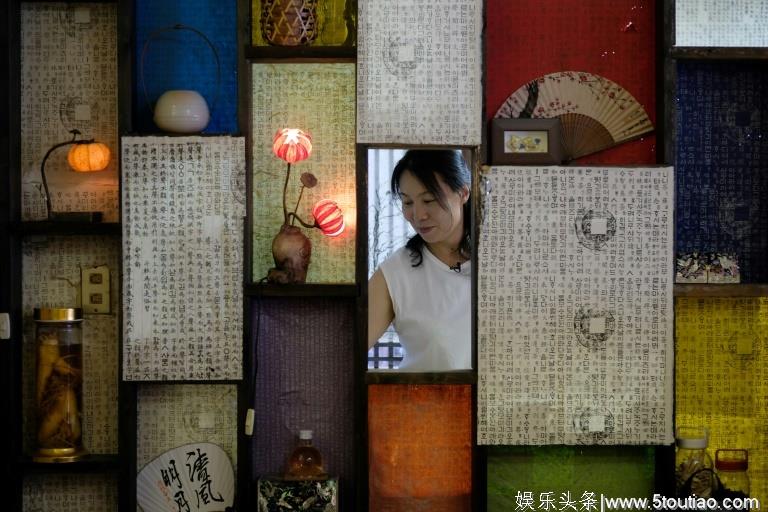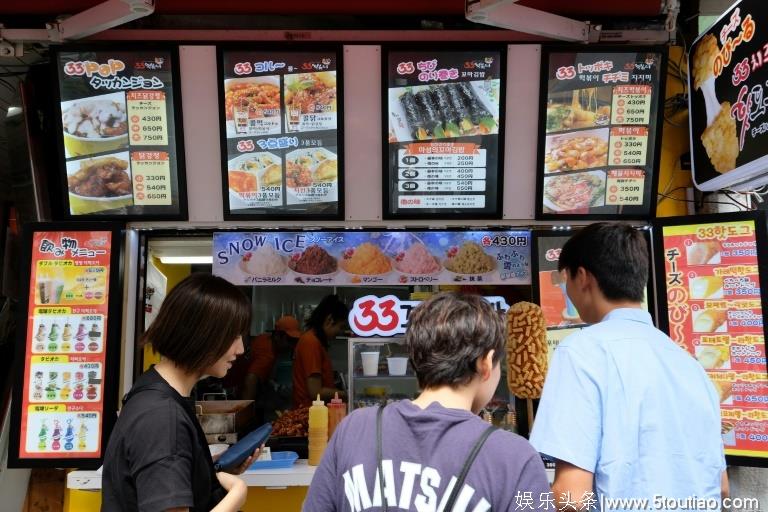K-Pop and Kimchi: Tokyo's 'Little Seoul' shrugs off spat
韩国流行音乐和泡菜:东京“小首尔”对两国之间的矛盾不屑一顾
来源:法新社 翻译:世界播

In the "little Seoul" area of Tokyo, Japanese shoppers flock to get their fix of K-pop and Korean face cream, seemingly shrugging off a deep freeze in Japan-South Korean ties.
在东京的“小首尔”地区,日本购物者蜂拥而至,购买韩国流行音乐和韩国面霜,似乎对日韩之间极度冰冷的关系不屑一顾。
Visitors to Shin-Okubo could be forgiven for thinking they had stumbled into a district in Seoul, with rows of restaurants serving kimchi and music shops selling the latest K-pop hits from BTS or Wanna One.
去新大久保韩国城的游客如果以为自己无意中走进了首尔的一个地区,那是情有可原的,那里有成排的餐厅供应泡菜,还有出售韩国男团“防弹少年团”或“Wanna One”最新韩国流行歌曲的音乐商店。
And in contrast to South Korea where anger over a deterioration in bilateral ties has sparked consumer boycotts of Japanese goods, it seems it takes more than a political spat to put off avid fans of Korean products.
相反,在韩国,对两国关系恶化的愤怒引发了消费者对日本商品的抵制。要想让韩国产品的狂热粉丝们却步,似乎光是一场政治口角还不够。
"I love everything, K-pop, the food, the clothes. I would also like the two countries to make up," said Anna Kaneko, a 19-year-old student making one of her regular trips to Shin-Okubo with a friend.
“我什么都喜欢,韩国流行音乐,食物,衣服。我也希望两国能和好。”安娜·卡涅科是一名19岁的学生,她和一个朋友定期去新大久保购物。

The latest row is deeply rooted in the bloody history between the two, particularly Tokyo's occupation of the peninsula as a colony, during which hundreds of thousands were forced to come to Japan as labour and women forced into brothels as wartime sex slaves.
最近的争端深深植根于两国之间的血腥历史,尤其是日本占领朝鲜半岛作为殖民地的历史。在这段历史中,数十万人被迫作为劳工来到日本,而妇女则被迫沦为战时的慰安妇。
Koreans remaining in Japan after Tokyo's defeat in World War II suffered discrimination and hardship and several exist to this day in a grey zone in terms of citizenship.
二战东京战败后留在日本的韩国人遭受歧视和苦难,至今仍有一些人的公民身份处于灰色地带。
The diplomatic friction has culminated in tit-for-tat trade restrictions and the scrapping of a military information-sharing pact between the two -- alarming the United States which has security treaties with both.
外交摩擦最终以针锋相对的贸易限制和撕毁两国之间的一项军事信息共享协议而告终,这让与两国都有安全条约的美国感到担忧。
Bae Cheo-leun, who runs an organisation bringing together South Koreans in Japan, admitted that a few years ago "hate speech" against Koreans could be heard in the streets around Shin-Okubo but this has not been the case during the most recent row.
裴哲伦在日本经营着一家组织,将韩国侨胞聚集在一起。他承认,几年前,在新大久保附近的街道上,可以听到针对韩国人的“仇恨言论”,但在最近的这次两国争端中,情况就不一样了。
"There was a law brought in to prevent it which has proved effective, even though there is no real punishment," Bae told AFP.
裴哲伦对法新社表示:“尽管没有真正的惩罚措施,但有一项防止这种情况发生的法律已经被证明是有效的。”
"The young Japanese K-pop fans who come to this district have a deep love for South Korean culture," added Bae, who accuses politicians on both sides of whipping up "nationalist sentiment."
裴哲伦补充说:“来到这个地区的日本年轻的韩国流行乐迷对韩国文化有着深厚的热爱。”他指责两国政界人士煽动“民族主义情绪”。
- 'NO Japan protests –
—日本没有抵制—
Kim Heun-hee, a Korean teacher who also runs a cultural cafe in Shin-Okubo, pointed to a difference in attitude between South Koreans living in Japan and those based in their homeland.
金香熙是一名韩国教师,在新大久保经营着一家文化咖啡馆,她指出居住在日本的韩国人和身在祖国的韩国人之间的态度差异。
"The feeling in South Korea is very severe against Japan now, so some people think it must be dangerous for South Koreans to be in Japan," said Kim.
金香熙说:“韩国现在对日本的抵制情绪非常强烈,所以一些人认为,韩国人在日本一定很危险。”

"On the other hand, Japanese people in Shin-Okubo don't want to talk about South Korea so much. Japanese people don't have much interest in politics but many people also seem to be reluctant to respond heatedly to the political difficulties."
“相反,新大久保的日本人不太愿意谈论韩国。日本人对政治不太感兴趣,但很多人似乎也不愿对政治困境做出激烈反应。”
Many South Koreans have taken up a "NO Japan" boycott campaign of Japanese products, ranging from beer, clothes and cosmetics to cigarettes, but there has been little apparent retaliation from consumers in the other direction.
从啤酒、服装、化妆品到香烟,许多韩国人对日本产品发起了一场“NO Japan”的抵制运动,但日本的消费者几乎没有明显的报复行为。
South Korean culture has spread globally in recent years, led by the huge success of K-pop stars such as Psy -- whose 2012 hit "Gangnam Style" became the first video to top one billion views on YouTube -- and BTS, which finally topped charts in the US and Britain earlier this year.
近年来,韩国文化在全球范围内传播开来,韩国流行歌星Psy(鸟叔)和防弹少年团名声大噪,Psy于2012年发布的歌曲《江南Style》成为第一部在YouTube上获得10亿次点击率的视频,而防弹少年团在今年早些时候在美国和英国的排行榜上名列前茅。
A particular craze among young Japanese women is for Korean cosmetics such as exfoliating creams, anti-acne masks or stick-on false nails.
在日本年轻女性中,有着一股特别的热潮:购买韩国化妆品,比如去死皮霜、祛痘面膜或假指甲。
But while there seems to be little public anger in Japan at South Korea, there is also scant expectation that the situation will improve any time soon.
不过,尽管日本公众对韩国似乎没有什么不满情绪,但也没有多少人认为形势会很快好转。
South Korean journalist Park Jin-hwan said that "tensions including historical issues and economic issues between the two countries will remain for a long time. I think Japan and South Korea are now entering a period like the Cold War."
韩国记者朴金焕说,“包括历史问题和经济问题在内的两国之间的紧张局势将会持续很长一段时间。我认为日本和韩国现在正进入冷战时期。”
So long as both sides have contrasting interpretations of the 1965 peace treaty that normalised diplomatic relations between the pair, political tensions will endure, added Park.
朴金焕还说,只要双方对1965年使两国外交关系正常化的和平条约的解释有分歧,政治紧张局势就会持续下去。
Bae said ties between Seoul and Tokyo were "the worst since World War II" but sees hope for the future on the streets of Shin-Okubo.
裴哲伦说,首尔和东京之间的关系处于“二战以来最糟糕的状态”,但他在新大久保的街头看到了未来的希望。

"Today I got off at Shin-Okubo station and I saw the town so busy with young people enjoying South Korean food and culture. These young people accept good as well as bad things about South Korea," Bae said.
“今天我在新大久保站下车,我看到这个商业街到处都是年轻人,他们享受着韩国的美食和文化。这些年轻人会接受韩国好的东西和坏的东西。”裴哲伦说。
"I have high hopes that people like them will respect culture no matter how sour the political situation gets."
“我非常希望不管政治形势变得多么糟糕,像他们这样的人都能一直尊重文化。”


